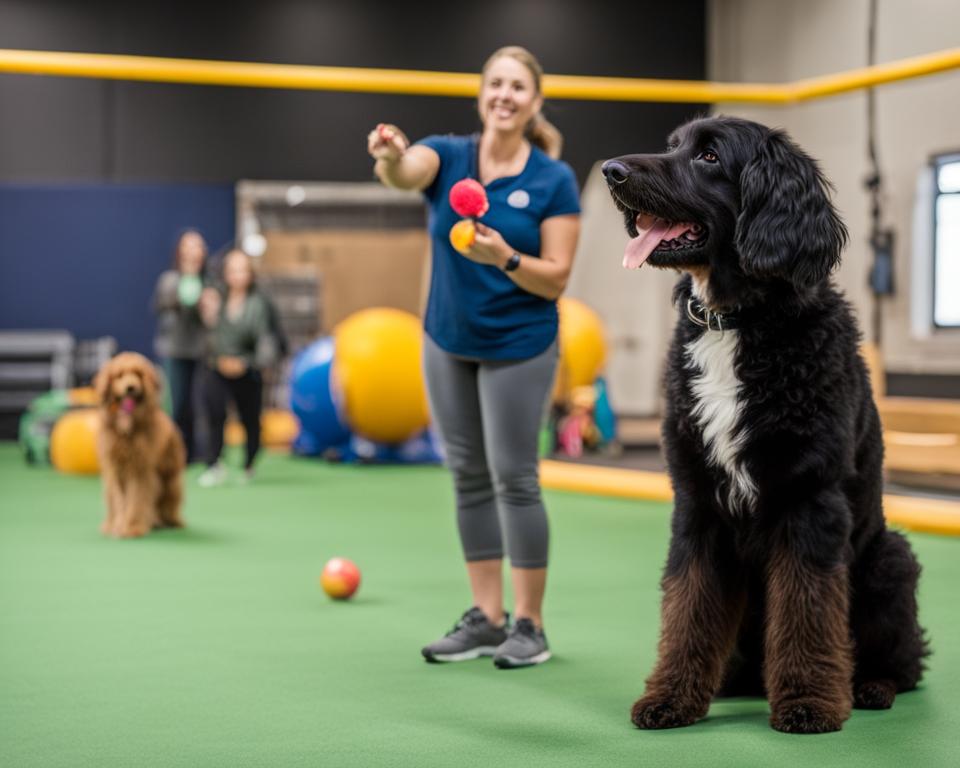Maintaining the health of your Bernedoodle is essential for their overall well-being and longevity. Regular veterinary check-ups, vaccinations, and preventive treatments are important. Providing a balanced diet, portion control, and regular exercise contribute to their health. Mental stimulation, dental care, grooming, socialization, and love and attention are also important aspects of their well-being.
Key Takeaways:
- Consistent veterinary care, balanced diet, and regular exercise contribute to the well-being of Bernedoodles.
- Mental stimulation, dental care, grooming, and socialization are crucial for their overall health and happiness.
- Love and attention play a vital role in maintaining the emotional well-being of Bernedoodles.
- Addressing behavioral challenges with proper training techniques is essential for a well-behaved Bernedoodle.
- Understanding and meeting the individual needs of your Bernedoodle is crucial for their overall well-being and behavior.
How Much Exercise Does a Bernedoodle Need To Stay Healthy and Happy?
Bernedoodles are energetic and playful dogs that require regular exercise to stay healthy and happy. The amount of exercise needed for a Bernedoodle varies depending on factors such as their age, size, and energy levels. As a general guideline, Bernedoodles typically require 30 minutes to 1 hour of physical activity each day.
Engaging in various activities can help meet their exercise needs. Taking them for walks or jogs in the neighborhood or local park is a great way to provide them with the physical stimulation they need. Playing fetch or participating in dog sports like agility can also help burn off their excess energy.
Mental stimulation is equally important for a Bernedoodle’s overall well-being. Incorporating training sessions and interactive toys into their routine can challenge their minds and prevent boredom. Additionally, incorporating nose work and food dispensing toys can provide a fun and engaging mental workout.
| Age | Exercise Recommendations |
|---|---|
| Puppy (8-16 weeks) | Short, frequent walks and play sessions |
| Adolescent (4-12 months) | Longer walks, playtime, and basic obedience training |
| Adult (1 year and older) | 30 minutes to 1 hour of physical exercise, mental stimulation, and training |
It’s important to consider your Bernedoodle’s individual needs and limitations when determining their exercise routine. Factors such as their health conditions, any previous injuries, or extreme weather conditions should be taken into account. It’s essential to avoid overexertion and provide them with plenty of breaks and water during exercise sessions.
Exercise Routine Tips for Bernedoodles:
- Start with shorter exercise sessions and gradually increase the duration as their stamina improves.
- Provide a mix of physical activities and mental stimulation to keep them engaged and prevent boredom.
- Consider their age and energy levels when planning their exercise routine.
- Avoid exercising them in extreme temperatures to prevent overheating or frostbite.
- Monitor their behavior and adjust their exercise routine accordingly. If they seem overly tired or reluctant to participate, it may be a sign that they need a rest day.
Planning a Nutritious Diet for Your Bernedoodle
When it comes to ensuring the health and well-being of your Bernedoodle, a nutritious diet plays a key role. Providing your furry friend with the right balance of nutrients is essential for their overall health and vitality. In this section, we will explore the dietary needs of Bernedoodles and provide some guidelines for planning a nutritious diet.
Dietary Needs of Bernedoodles
Bernedoodles have specific dietary needs that vary depending on factors such as their age, size, and activity level. As a crossbreed between Bernese Mountain Dogs and Poodles, they may inherit certain health conditions, such as hip dysplasia or allergies, which may require special dietary considerations.
It’s important to consult with your veterinarian to determine the specific dietary needs of your Bernedoodle. They can provide guidance on the appropriate balance of protein, carbohydrates, fats, and essential nutrients.
Choosing the Right Dog Food
When selecting a dog food for your Bernedoodle, opt for high-quality brands that offer complete and balanced nutrition. Look for products specifically formulated for their life stage, whether it’s puppy, adult, or senior. These formulas are designed to meet the unique nutritional requirements of each stage of their life.
Read the ingredient list carefully and avoid dog foods that contain artificial additives, fillers, or by-products. Look for real meat sources as the primary ingredients, such as chicken, beef, or fish. Whole grains, fruits, and vegetables should also be included to provide essential vitamins, minerals, and fiber.
| Nutrient | Percentage |
|---|---|
| Protein | 25% – 30% |
| Fat | 10% – 15% |
| Carbohydrates | 45% – 60% |
| Fiber | 3% – 5% |
| Moisture | 10% – 12% |
Feeding Guidelines
Feeding your Bernedoodle the right amount of food is crucial to maintain a healthy weight and prevent obesity. The feeding guidelines provided on the dog food packaging can serve as a starting point, but it’s important to monitor your dog’s weight and body condition regularly and make adjustments as needed.
Divide the daily recommended amount of food into two or three meals to prevent bloating and promote better digestion. It’s also important to provide fresh water at all times and avoid excessive treats or table scraps, as these can contribute to weight gain and nutritional imbalances.

By planning a nutritious diet for your Bernedoodle and following the feeding guidelines, you can help ensure their overall health and well-being. Remember to consult with your veterinarian for personalized recommendations based on your Bernedoodle’s specific needs.
Providing Mental Stimulation for Bernedoodles
Bernedoodles are intelligent and energetic dogs that thrive when provided with ample mental stimulation. Engaging their minds through various activities and training sessions is crucial for their overall well-being. Here are some effective ways to provide mental exercise for your Bernedoodle:
- Interactive Toys: Invest in puzzle toys and treat-dispensing toys that require your Bernedoodle to figure out how to access the treats. This not only keeps them entertained but also stimulates their problem-solving skills.
- Training Sessions: Regular training sessions not only help in shaping your Bernedoodle’s behavior but also provide mental stimulation. Teach them new commands, tricks, and engage in obedience training.
- Nose Work: Bernedoodles have an excellent sense of smell. You can engage them in scent games or hide treats around the house for them to find. This taps into their natural instincts and keeps them mentally engaged.
- Playdates and Socialization: Arrange playdates with other dogs to provide socialization opportunities for your Bernedoodle. This helps keep their social skills sharp and prevents boredom.
It’s important to note that mental stimulation should be tailored to your Bernedoodle’s individual needs and energy levels. Be patient and consistent in incorporating these activities into their daily routine. By providing sufficient mental exercise, you can ensure that your Bernedoodle remains mentally sharp and content.

Table: Comparison of Mental Stimulation Activities for Bernedoodles
| Activities | Description | Benefits |
|---|---|---|
| Interactive Toys | Toys that require problem-solving skills to access treats or rewards. | Stimulates problem-solving abilities and keeps them entertained. |
| Training Sessions | Regular obedience training and teaching new commands or tricks. | Provides mental exercise and strengthens the bond between owner and dog. |
| Nose Work | Scent-related games and hiding treats for them to find. | Taps into their natural instincts and enhances their sense of smell. |
| Playdates and Socialization | Arrange opportunities for interaction with other dogs. | Keeps social skills sharp and prevents boredom. |
Table: Comparison of Mental Stimulation Activities for Bernedoodles
Using Training and Exercise for Bernedoodle Behavior
Training is a crucial aspect of addressing behavioral challenges in Bernedoodles. By implementing effective training techniques, you can establish control and reinforce desired behaviors in your furry companion. One powerful approach is positive reinforcement, which involves rewarding your Bernedoodle’s good behavior with treats, praise, or playtime. This method encourages them to repeat those behaviors, while also strengthening the bond between you and your pet.
Consistency is key when it comes to training. Clear verbal cues and repetition help your Bernedoodle understand your expectations. Be patient and persistent, as it may take time for them to grasp new commands. Remember to use a confident and calm tone of voice during training sessions, creating a positive and encouraging environment for your beloved pet.
Exercise is equally important for managing Bernedoodle behavior. Regular physical activity helps prevent behavioral issues that can arise from pent-up energy or boredom. Engage in activities that cater to your Bernedoodle’s exercise needs, such as daily walks, jogging, or interactive play sessions. These not only provide physical stimulation but also mental and emotional enrichment.
Crate training can also be an effective tool in managing your Bernedoodle’s behavior. By providing them with a cozy and secure space, you create a safe haven where they can retreat and relax. This can help reduce anxiety and prevent destructive behavior when you’re not able to supervise them closely.
FAQ
What are some common behavioral challenges in Bernedoodles?
Common behavioral challenges in Bernedoodles include excessive barking, jumping, leash pulling, separation anxiety, and destructive chewing.
What training tips can help modify Bernedoodle behavior?
To modify Bernedoodle behavior, use positive reinforcement techniques, establish consistent verbal cues, provide mental stimulation, and consider professional training assistance if needed.
How can I address Bernedoodle behavior problems?
Addressing Bernedoodle behavior problems requires identifying the root cause, providing proper exercise and mental stimulation, implementing consistent training techniques, and seeking professional guidance if necessary.
How much exercise does a Bernedoodle need to stay healthy and happy?
Bernedoodles typically require 30 minutes to 1 hour of physical activity each day, depending on their age, size, and energy levels. Various activities such as walks, jogging, playing fetch, and dog sports can help meet their exercise needs.
How should I plan a nutritious diet for my Bernedoodle?
When planning a nutritious diet for your Bernedoodle, consider factors such as their age, size, and activity level. Choose a high-quality dog food specifically formulated for their life stage, avoid artificial additives or fillers, and monitor their weight and body condition regularly.
How can I provide mental stimulation for my Bernedoodle?
To provide mental stimulation for your Bernedoodle, use interactive toys, engage in training sessions, incorporate nose work and food dispensing toys, arrange playdates and socialization opportunities with other dogs, introduce novelty to their environment, and engage them in mental games and problem-solving activities.
How can training and exercise help with Bernedoodle behavior?
Training and exercise are crucial in addressing Bernedoodle behavior. Positive reinforcement techniques, consistent training, and providing adequate exercise help prevent behavioral issues caused by pent-up energy or boredom.

Leave a Reply